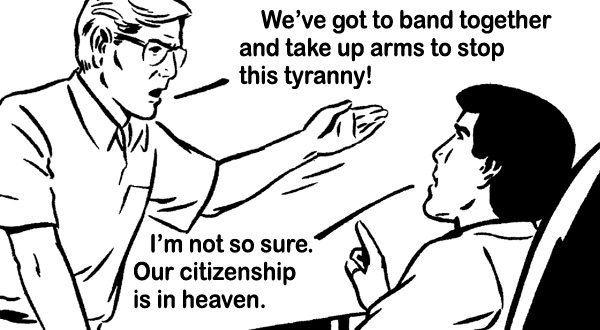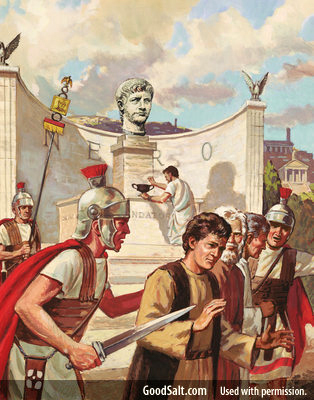 It’s one thing to be simple, but another to be ignorant and lacking understanding. It’s often so shocking, heartbreaking and infuriating for me to see in my home country the level of ignorance concerning the things of the Lord or especially the history of faith.
It’s one thing to be simple, but another to be ignorant and lacking understanding. It’s often so shocking, heartbreaking and infuriating for me to see in my home country the level of ignorance concerning the things of the Lord or especially the history of faith.
If I asked 100 Americans who Martin Luther was, I honestly believe over 90% would ask if I meant Dr. Martin Luther King. Here’s another example.  I have some friends here with master’s degrees or doctor’s degrees and often I’ll hear from them that “Allah” is a moon god, an idol that the Arabs worship.
I have some friends here with master’s degrees or doctor’s degrees and often I’ll hear from them that “Allah” is a moon god, an idol that the Arabs worship.
My reaction is exasperation and real sadness. Maybe it’s like when God spoke through Hosea to the nation of Israel some 2800 years ago, “My people are destroyed for lack of knowledge. Because you have rejected knowledge, I also will reject you.” (Hosea 4:6)
And I’m not just talking about “taking God out of the schools”. I’m talking about a huge falling away from a knowledge of the significance of spirituality in the civilization of mankind. I was in my third year of university when I personally experienced that the God of Abraham was for real. Among my many emotions at that time was anger at how little I’d learned about anything having to do with the great changers of history who were not politicians, businessmen or scientist but were purely spiritual people.
I myself had no idea who Martin Luther was, the German priest who set in motion the Reformation in the 1500’s and changed the course of European history. Joan of Arc? Never heard of her. But an illiterate girl who herded swine “heard voices” in the 1400’s. And by obeying the voice of God, she ultimately led the armies of France to defeat their invaders at that time, the English.
And there’s so many more. Saint Patrick? “Ha, ha, ha! Let’s all wear green and get drunk”, most would say. But that man virtually alone changed the course of the history of Ireland, starting a wave of faith and devotion in what was a land beyond the edge of civilization at that time. Patrick’s influence continued in his followers for several hundred years, inspiring other missionaries in the next two centuries to go out to places like the darkest … no, not Africa but places like modern Holland, Germany and the rest of Europe to take the light and love of Jesus Christ and to turn those peoples to the Lord during the times called the Dark Ages.
Did you know that? I didn’t until I was way up into my adult years. But it was those spiritual people, people of faith who changed their generations, brought civilization and spiritual enlightenment to their times and neighbors and that’s why we have what has been called “Western Civilization”.
So there’s just this huge irony. We have smart phones, the latest apps, Google glass and every kind of advancement and technical innovation that our hearts could desire. But all the while, the gloom of ignorance and the lack of basic knowledge of the spiritual world increases like the armies of Mordor across the world. Even a knowledge that there is a God is less and less a part of the mentality of hundreds of millions of people in the “advanced” and “civilized” nations of the world.
It’s a sad, ominous, foreboding situation to observe. Hosea also said, “They have sown the wind and they will reap the whirlwind.” (Hosea 8:7) How can there not come a reaping and reward for society’s abandonment of God and our eternal foundations, for ignorance of the reality of the spiritual world?
I experienced it myself. I was brought up in a home that didn’t acknowledge a prayer-answering God. “Maybe there’s a God but He is way off somewhere. Don’t bother Him and He won’t bother you”, seemed to be the idea. So in my greatest time of trial and difficulty, I simply and truly didn’t know there was a God, didn’t know or understand virtually anything about sin, faith, repentance, submission, redemption or grace. These were all utterly unknown to me. It’s an absolute miracle of God that He somehow pulled me through that time.
How many hundreds of millions now are in just as much spiritual darkness and delusion, no matter how advanced the technical gadgets they have? May God help us to do all we can to share His light, spread His truth and to keep our candles burning in this time of billowing darkness that we live in, even though most are blissfully ignorant of their ignorance.







 Pilate asked Jesus if He was a king. And Jesus said, “
Pilate asked Jesus if He was a king. And Jesus said, “ Another article, “
Another article, “ This dilemma, this tension, has historically led many believers to make stark, immediate decisions. Early Roman Christians were often forced to choose between pledging allegiance to the Roman emperor or facing death. Countless numbers chose to stand with Jesus Christ and the God of Abraham, rather than with an earthly king or country. It’s easy to think, “That could never happen here. We’re too advanced, too modern, too intelligent for that.”
This dilemma, this tension, has historically led many believers to make stark, immediate decisions. Early Roman Christians were often forced to choose between pledging allegiance to the Roman emperor or facing death. Countless numbers chose to stand with Jesus Christ and the God of Abraham, rather than with an earthly king or country. It’s easy to think, “That could never happen here. We’re too advanced, too modern, too intelligent for that.” Our true calling is to stand for the truth of Scripture, especially using the power of prophecy to share the reality of the world’s condition and the possible impending fulfillment of end-time events. It is there that I believe the Lord is waiting for us, calling us to be His army of faithful witnesses, proclaiming what has been foretold for over 2,000 years—the final events before His return.
Our true calling is to stand for the truth of Scripture, especially using the power of prophecy to share the reality of the world’s condition and the possible impending fulfillment of end-time events. It is there that I believe the Lord is waiting for us, calling us to be His army of faithful witnesses, proclaiming what has been foretold for over 2,000 years—the final events before His return.
 It turns out that Naomi had a relative named Boaz. Making a short story shorter, Boaz and Ruth met up and, in modern terminology, took a liking to each other. Fulfilling Jewish customs and law, Boaz went through the process of those times to take responsibility for the inheritance Naomi’s husband had left, which would include the responsibility of marriage to Ruth.
It turns out that Naomi had a relative named Boaz. Making a short story shorter, Boaz and Ruth met up and, in modern terminology, took a liking to each other. Fulfilling Jewish customs and law, Boaz went through the process of those times to take responsibility for the inheritance Naomi’s husband had left, which would include the responsibility of marriage to Ruth. This all worked out, and it ended up that Boaz and Ruth had a son together, Obed. And as the Bible says,
This all worked out, and it ended up that Boaz and Ruth had a son together, Obed. And as the Bible says,